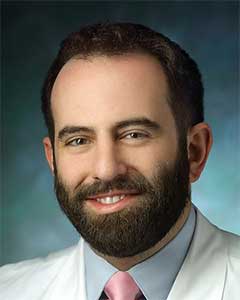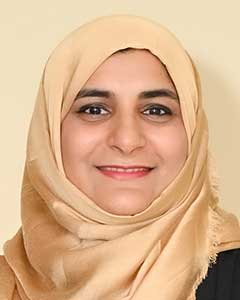Johns Hopkins Center for Promoting Embedded Research in the Learning Health System was created to teach embedded investigators the skills of patient centered outcomes research and comparative effectiveness research.
Our Mission
JH C- PERLHS impacts health by conducting research and training investigators within learning health systems to change care delivery and improve patient outcomes.
We prepare
embedded investigators to apply rigorous methods to generate and disseminate knowledge across the Johns Hopkins Health System and the state of Maryland.
We engage
embedded researchers for training. We welcome investigators embedded within the precision-medicine initiatives of Johns Hopkins, investigators embedded within clinical and operational functions of the Johns Hopkins Health System, and investigators embedded in entities working to advance population health across Maryland.
The PERLHS Process
Supported by the Agency for Health Care Research and Quality (AHRQ) and The Patient-Centered Outcomes Research Institute (PCORI), JH C-PERLHS is a research and training center charged with the following aims:
Develop
Develop the curriculum and processes of the PERLHS Academy in service of advancing the CER/PCOR skills of embedded researchers. The curriculum will build upon the CER/PCOR expertise of Johns Hopkins faculty, including the academic curriculum we developed to support the PCORI Methodology Standards in 2015.
Recruit
Recruit cohorts of embedded scholars from diverse venues to train in the PERLHS Academy. We will recruit cohorts of 10 scholars annually and include: a) learners embedded in the Johns Hopkins InHealth Precision Medicine Centers of Excellence; b) learners embedded within the Johns Hopkins Medicine health system aimed at delivering high-value health care; and c) learners embedded in the entities advancing patient and population health across Maryland, including Federally Qualified Health Centers. We will also recruit one post-doctoral trainee annually, who will work collaboratively across the projects of several scholars, while developing his/her own skills.
Train
Train PERLHS scholars as they conduct mentored, embedded research supported by core and needs-based didactic training, as well as core and needs-based experiential learning. Scholars will be supported with individual mentorship as well as data resources, analytic support, and funds for their embedded work.
Evaluate
Evaluate the PERLHS Academy’s impact on embedded scholars, and the impact of the scholars’ work on their entities’ goals, looking toward sustainability of PERLHS after the completion of the award.
Our Team
-

Jill A. Marsteller, Ph.D., M.P.P., PERLHS MPI is a Professor in the Department of Health Policy and Management at J Bloomberg School of Public Health and leads the Administration and Evaluation Core of PERLHS. Her expertise in intervention implementation and evaluation of the influence of structural and contextual variables in health services delivery, as well as her administrative experience and history of mentorship, make her an ideal leader for an LHS training program. Dr. Marsteller is a member of the Delta Omega Public Health Honor Society and was awarded Advising, Mentoring and Teaching Recognition Awards in 2009, 2012, 2019 and 2022 for outstanding mentorship. Her research for the last two decades has focused on implementation of quality improvement, patient safety, and disparities reduction interventions in real-world settings, including physician practices, intensive care units, home care agencies, nursing homes and cardiac operating rooms. With colleagues, she designed and built an LHS among Coordinated Specialty Care clinics offering First Episode of Psychosis care in Maryland and Pennsylvania. She is the Director of Research for the Armstrong Institute for Patient Safety and Quality and an executive CUSP champion for a neurological ICU and epilepsy monitoring unit in the Johns Hopkins system.
-

Jodi B. Segal, M.D., M.P.H., PERLHS MPI is a Professor of Medicine at the Johns Hopkins University School of Medicine and leads the Research Education Core. She has faculty appointments in the Bloomberg School of Public Health in the Departments of Health Policy and Management and in Epidemiology. She has been involved in the field of evidence generation and synthesis for more than 20 years, and is a national leader in comparative effectiveness research, having led the national workshop, supported by AHRQ, to establish CER competencies. She developed the first course offered in the US in the field. She also led the development of the PCORI Methodology Standards Academic Curriculum with the preparation of 22 hours of recorded lectures and teaching materials. She previously was the PI of the AHRQ CER T32 training grant at Hopkins and the NRSA T32 training grant in primary care research. She is currently the co-PI of a T32 training grant from NHBLI to train pre- and post-doctoral trainees in pharmacoepidemiology methods. She was the PI of the Hopkins Developing Evidence to Inform Decisions about Effectiveness (DEcIDE) Center (funded by AHRQ from 2009-2014) and was an associate director of AHRQ’s Evidence-based Practice Center at Johns Hopkins for five years. She practices ambulatory general internal medicine in East Baltimore.
-

Harold Lehmann, M.D., Ph.D., Dr. Lehmann leads the Research Data Analytic Core for PERLHS. He is a Professor of Biomedical Informatics and Data Science in the Department of Medicine, and Fellow of the American College of Medical Informatics. He led the informatics training programs, now called Biomedical Informatics and Data Science (BIDS), of the Johns Hopkins School of Medicine for 20 years. Dr. Lehmann’s programs included certificate, masters, and doctoral programs for working professionals with similar backgrounds as our intended PERLHS scholars. Dr. Lehmann was the founding informatics lead for the ICTR and is a member of the Data Trust Research Subcouncil. He is presently the Johns Hopkins informatics lead for PCORnet/PaTH and a co-investigator in the PCORnet-wide Query Formulation group. Under Dr. Chute, he is a co-investigator in the Data Ingestion and Harmonization Workstream and leads the Analytics Methods and Data Standards group for PCORnet, responsible for Johns Hopkins data submissions. He has been an active member for the past five years of the EBMonFHIR project, devoted to articulating how evidence and research should be communicated in the Internet/FHIR environment. Dr. Lehmann will direct the efforts in each Aim including working with staff to create and maintain the Library.
-

Matthew Robinson, M.D. will be the Associate Director of the Research Data Analytic Core. He is an Assistant Professor in the Division of Infectious Diseases who has worked with the Johns Hopkins Precision Medicine Center of Excellence for COVID-19 applying machine learning and causal inference techniques to predict COVID-19 outcomes. His work was incorporated into the EHR of all of the Johns Hopkins Medicine hospitals. He has leveraged this experience to teach others and co-directs the Introduction to Precision Medicine Data Analysis course in BIDS. He and Dr. Lehmann will work with the scholars individually to assure their connection to appropriate resources. RDAC will work closely with both the Administrative Core and the Research Educational Core. Dr. Segal will have primary oversight over the RDAC and will assure that the REC and the RDAC are closely aligned on achieving their aims and meeting the needs of the scholars.
-

Theodore “Jack” Iwashyna, M.D. is the Associate Director of the Research Education Core. A Bloomberg Distinguished Professor, he blends acute care expertise with health services research to better understand how an array of factors affect a patient's life course.
-

Mohammad Naqibuddin, M.D., M.P.H. is a researcher-physician at the Johns Hopkins School of Medicine, Armstrong Institute for Patient Safety and Quality. He is the research program manager for the PERLHS program. He has been involved in research work seeking to prevent MRSA, testing the value of patient-ID photos to prevent wrong-patient orders, and improving health-related quality of life and reducing health care costs for patients with chronic obstructive pulmonary disease. During the COVID-19 pandemic, he was also involved in research on health care providers'/workers' safety at the Johns Hopkins School of Medicine.
-

Molly Kilcullen, Ph.D.(c)., M.A., is the Associate Director of the Administration and Evaluation Core of PERLHS and a senior data analyst at the Armstrong Institute at Johns Hopkins University. She is also a Ph.D. candidate in the Industrial-Organizational program at Rice University in Houston, TX, working under the supervision of Dr. Eduardo Salas. She received her master’s degree in Industrial-Organizational psychology at George Mason University and her undergraduate degree in psychology from Virginia Tech. During her time in her graduate program at George Mason, she was a research fellow at the Army Research Institute at Fort Belvoir, VA. Her areas of expertise include teamwork, training, leadership, communication, patient safety and safety culture.
-

Shagufta Farheen, D.D.S., M.P.H. is a Faculty Research Associate in the Department of Health Policy and Management at Johns Hopkins Bloomberg School of Public Health. She is the Research Coordinator for PERLHS. She received her M.P.H. degree from Johns Hopkins Bloomberg School of Public Health and her Dental Surgery degree from Aligarh Muslim University, India. She has a certificate in Quality, Patient Safety and Outcomes Research from Johns Hopkins Bloomberg School of Public Health. She has past research experience at Harvard Medical School and Johns Hopkins Medicine. Her research focuses on health equity, healthcare access, racial disparities, health policy, pain management, infection prevention, patient-centered care, patient safety in the hospital and other settings, quality improvement and outcomes research, healthcare communications and collaboration, quality of life, oral health equity, tobacco cessation, global health, clinical research and infectious diseases. She leverages her clinical experience and research experience with her data-driven solutions-oriented mindset, strategic planning, analytical thinking, leadership, communication and project management skillset to improve health outcomes. She also does support tasks at the Johns Hopkins Center for Health Services and Outcomes Research (CHSOR).
News and Publications
AHRQ and PCORI Invest in Learning Health Systems Scientist Training (AHRQ, Jan. 23, 2024)
AHRQ Training Projects Funded by PCOR Trust Fund. Content last reviewed January 2024. Agency for Healthcare Research and Quality, Rockville, MD.
Learning Health System Embedded Scientist Training and Research (LHS E-StaR) Centers. Content last reviewed January 2024. Agency for Healthcare Research and Quality, Rockville, MD.
